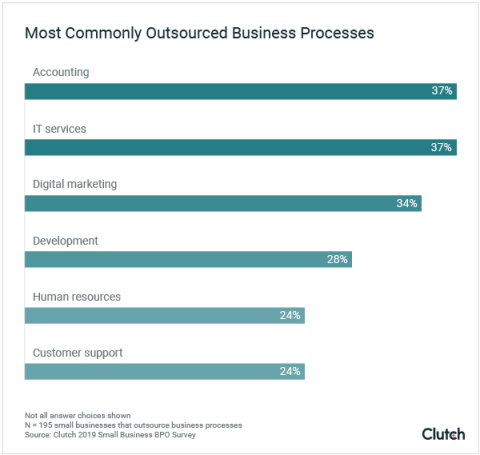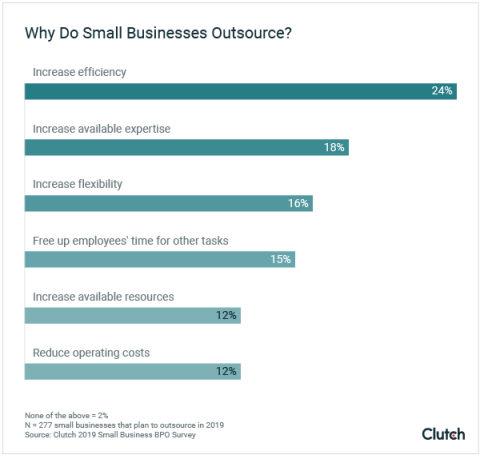

Updated December 17, 2025
In 2019, more than one-third of small businesses currently outsource a business process, and 52% planned to do so. Small businesses will outsource to increase efficiency and expertise, and most commonly seek support for accounting, IT services, and digital marketing responsibilities. Although outsourcing can provide small businesses with much-needed, cost-effective support, businesses should choose outsourced services with their expectations and communication styles in mind.
Updated March 23, 2022
The global outsourcing market totaled $85.6 billion in 2018. Although this is a dip from $104.6 billion in 2016, the outsourcing market remains a dominant force.
Outsourcing isn’t only available to large firms, though. Our 2019 data showed that more than one-third of small businesses (37%) outsourced a business process, and more than half (52%) planned to outsource.
In 2019, Clutch surveyed 529 small business owners and managers to understand their outsourcing plans and preferences.
Small businesses can use this data to better inform their outsourcing decisions, including what tasks they should outsource and how to evaluate outsourcing partners.
Use Clutch's directory of BPO providers to find the right outsourcing partner for your business.
Outsourcing can improve a small business’s efficiency and bottom line, but it should be done thoughtfully to reduce communication or security mishaps.
In 2019, more than one-third of small businesses (37%) outsourced a business process.

Businesses may choose to outsource for a variety of reasons such as increasing efficiency, available skills, or freeing up employees’ time for other tasks.
Growth strategist and outsourcing expert Drew DuBoff chose to outsource certain social media tasks.
“I decided to outsource Pinterest management for my blog because I quite honestly didn't have the time I needed to keep up with it,” DuBoff said. “I understood exactly what needed to get done to grow the account, but I needed someone additional to help me schedule pins, create graphics, get on group boards, and grow the account, in general.”
The freelancer freed up DuBoff’s time to focus on other tasks, as opposed to the day-to-day management of the Pinterest account.
Brad Ormsby, owner of Colorstone Marketing, a marketing agency in Modesto, Calif., chooses to outsource certain tasks for his business. He says the outsourced tasks should meet four criteria:
By following these criteria, you can ensure you’re outsourcing responsibly, both for yourself and for the contractor.
Small business outsourcing can be an effective means of boosting a business’s efficiency and expertise, but businesses should approach it thoughtfully.
Small businesses outsource more for processes that require specific skills.
In 2019, small businesses most commonly outsourced finance and accounting (37%), as well as IT services (37%).

These tasks may be most commonly outsourced because they are highly technical and require specific skills such as understanding how to operate accounting software or how to develop in a programming language.
Experts noted that accounting decisions can also set the direction for all other operations within a business. Small businesses can benefit from outsourcing certain aspects of accounting to an expert, instead of inefficiently or incorrectly attempting it on their own, potentially leading to a cascade of misdirection and inaccurate numbers.
“When you set your goals and your KPIs, you want to make sure they’re guiding the business in the right direction,” said Erica Quigley, a business operations consultant at Quigley Management Consulting.
Past data suggests that small businesses aren’t completely comfortable in their accounting skills. Nearly one-third (30%) of small business owners believed they were overpaying their taxes, and 61% did not create a formally documented budget in 2018.
These small businesses may benefit from seeking outside expertise to create a budget or ensure they aren’t paying too much on their taxes.
Small businesses most commonly outsource more technical responsibilities that require certain skills.
A larger number of small businesses planned to outsource in 2019. Experts will likely recommend these businesses set clear goals and expectations for contractors to maximize the success of an outsourcing relationship.
More than half of small businesses (52%) planned to outsource in 2019.

Small businesses plan to outsource the same types of tasks as in 2018, including accounting (21%), IT services (20%), and digital marketing (20%)
Although outsourcing offers benefits, it can also be detrimental to a business’s goals if not set up and managed properly.
Experts noted that when outsourcing, small businesses should pay careful attention to:
Without a clear plan of action and consistent oversight, outsourcing relationships can sour.
Vivek Kumar, founder and CEO of Qlicket, an employee kiosk feedback system, described an instance where outsourcing failed: “At one point, we spent hundreds of dollars on a web developer in Turkey who suddenly stopped responding to our messages and never delivered on his assignment.”
Kumar now fully believes in frequently engaging and communicating with contractors to avoid similar situations. Contractors may not be a direct employee of a company, but they should still be encouraged to commit to the business’s expectations and goals.
“Whether it comes in the form of relocating a founder, daily check-in calls, or some other method, transparency and frequent communications are necessities for small business outsourcing,” Kumar said.
Consistent communication can prevent issues that may negate the cost benefits of outsourcing.
Juli Lassow, founder and principal of JHL Solutions, a business solutions and management firm, also discussed the importance of setting and communicating expectations:
“Get crystal clear on your expectations [and your customers],” Lassow said. “Before looking for your next partner, be sure that you are able to outline all the technical and aesthetic expectations you have for the production of your products ... and how to communicate that to someone who would take this over for you.”
If you do not have clear goals and guidelines for your contractors, you won’t be able to determine if outsourcing actually provides benefits to your business.
Overall, small businesses should understand what they expect from contractors and the results they’d like to see before handing over their work. The most commonly outsourced opportunities require this transparency.
Outsourcing can increase small businesses’ efficiency, allowing in-house employees to focus on projects that fit their skills and grow the company.
Among small businesses that chose to outsource in 2019, the largest percentage (24%) said they did so to increase efficiency, while 18% were seeking assistance from an expert.

Rio Rocket runs a graphic design, web development, and marketing business. He outsources more “laborious and redundant” tasks such as creating custom PHP coding or re-writing content.
“[Outsourcing] gave me more time to negotiate new contracts, handle client correspondence, and manage the creative direction of current projects,” Rocket said. “Through outsourcing, I could manage 10 to 15 or more projects and still maintain clarity and a fresh state of mind.”
“Through outsourcing, I could manage 10 to 15 or more projects and still maintain clarity and a fresh state of mind.”
Outsourcing allows Rocket to focus on running and developing his company, as opposed to more mundane day-to-day responsibilities.
Sam Rooi, project manager at Intrepid Wellbeing, a content site focusing on health and wellbeing tips for people with active lifestyles, helped outsource his company’s mobile app development because at that point, they did not have the knowledge in-house.
Intrepid Wellbeing’s contractors provided more results than initially agreed upon.
“As a bonus, they did a UI overhaul and presented us with a design that was really much better than ours, and they didn't charge extra for that unscoped design work,” Rooi said. “The end result is an app that has surpassed our target engagement metrics.”
Yet, Rooi cautions that despite their overwhelmingly positive experience, outsourcing still may not be for every small business due to the time commitment. A positive outsourcing partnership can only occur if there’s consistent, in-depth communication.
“It's certainly not something that we've found we can get by with a low effort, ‘fire-and-forget’ approach of just handing over the requirements document and hoping for the best,” Rooi said. “It was quite a hectic period getting the project delivered with outsourcing.”
Rooi still felt like outsourcing was the right choice for Intrepid Wellbeing, though, because the company did not have the mobile app development expertise in-house at the time. Otherwise, it could not have developed a high-quality product at an affordable cost.
Outsourcing can increase businesses’ capabilities and efficiency but requires intensive time and focus to produce results.
Larger businesses are more than twice as likely to outsource as smaller businesses, but small businesses can find affordable options such as freelancers.
In 2019, fewer than one-third of companies (29%) with 50 or fewer employees outsource, compared to 66% of those with 51 to 500 employees.

Quigley said that smaller businesses are more hesitant to spend money.
“Businesses that have less than [$5 million/year in] revenue … tend to want to keep their money internally and not pay people to do things they feel they can do themselves,” Quigley said.
Yet, outsourcing doesn’t need to be a cost-intensive process. Erik Oehler, the global digital content marketing manager at Alaris, an information capture solutions company, uses sites such as Fiverr and Upwork for simpler projects.
“[These sites offer] a huge opportunity to pack a much bigger punch for a fraction of the price,” said Oehler. “Sites like Fiverr open your opportunities to an entire world of creative freelancers, and I’ve gotten some great work done from them for companies I’ve worked for and with.”
By seeking individual freelancers, smaller businesses can find the help they need at more affordable rates.
Outsourcing can benefit businesses of all sizes, but they may need to seek different outsourcing partners based on their budgets.
Read this: 'Why Budgeting is Important: 5 Advantages of a Budget'
More than one-third of small businesses (37%) outsourced a business process, and more than half (52%) planned to in 2019.
The most commonly outsourced business processes in 2019 required specific skills such as accounting (37%), IT services (37%), and digital marketing (34%).
Small businesses primarily outsourced to increase efficiency (24%) and available expertise (18%), but they should approach outsourcing partnerships thoughtfully to ensure communication and expectations are streamlined.
Finally, small businesses with 50 or fewer employees are far less likely to outsource, according to 2019 data. Yet, smaller businesses can find more affordable outsourcing options such as using freelancers as opposed to agencies.
Outsourcing offers significant benefits to small businesses if done responsibly.
Ready to get started? Find an outsourcing provider using our directory of service providers.
Additional Reading:
In 2019, Clutch surveyed 529 small business owners and managers across the U.S. We define small businesses as having limited revenue and between 1 and 500 employees, which corresponds to the Small Business Administration’s definition of small business.
More than half (52%) of respondents are male, and 48% are female. Twenty-nine percent (29%) of respondents ages 18-34, 45% are ages 35-54, and 27% are 55 years or older.
Fourteen percent (14%) of respondents’ businesses have 1 employee; 40% have 2 to 10 employees; 24% have 11 to 50 employees; 15% have 51 to 250 employees; and 7% have 251 to 500 employees.
Respondents are from the South (44%), Northeast (20%), Midwest (18%), and West (18%).


